Foreword: The aim of our Farmer & Artisan Stories articles is to help you “know your farmer” and to give you a better sense of what it’s like to be a farmer (short answer: not easy). No other industry that we know of is so foundationally important to every human being — we all need to eat — yet so subject to the whims of climate, weather, public policy, and consumer behavior patterns.
This article is a tough read because it doesn’t paint a particularly hopeful view of what’s happening in the US agricultural sector right now, much less where things might be headed. Nevertheless, we feel it’s important to share the real stories and perspectives of our — and your — farmers. If these stories don’t get told and shared, then the general public and policy makers/politicians have no idea what our farmers are facing and can’t be expected to act in their own enlightened self-interest.
Bill Brammer and the origins of Be Wise Ranch
Bill Bramer didn’t grow up in a farming family, but he did grow up surrounded by farms. His childhood home was north of Los Angeles in the San Fernando Valley, which at the time was mostly chicken farms scattered between fruit and nut orchards.
He didn’t intend to become a farmer. In fact, in the early 70s, he went to college on a golf scholarship and studied business and philosophy. Somewhere along the way, he read Silent Spring by Rachel Carson, a book which not only raised public awareness about the effects of indiscriminate pesticide use, but also led to the banning of DDT while spurring the modern environmental movement and the creation of the US Environmental Protection Agency (EPA).
In 1977, he decided to go into the farming business, and Be Wise Ranch was born. The aim was to build the health and fertility of their farm’s soil in order to grow the most nutrient-dense, healthy produce as possible. This meant no synthetic fertilizers or pesticides. Instead, they used compost to build soil fertility and soil organic matter, and integrated pest management approaches to help control pest insects and animals. Basically, by building a healthy ecosystem, they believed they could produce healthier, better tasting food without poisoning the water, land, and wildlife around them.
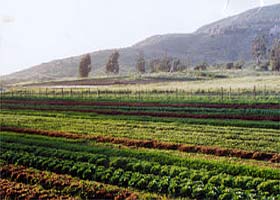
Fields of organic vegetables growing at Be Wise Ranch. Be Wise Ranch has yielded as much produce per acre as conventional farms, despite not using synthetic fertilizers or pesticides.
It’s also worth noting that organic farmers at this time were completely on their own – university extension agencies which received much of their funding via the agri-chemical conglomerates thought Bill and other sustainability-oriented farmers were crazy. Bill recalls a conversation with UC-Davis agriculture specialists: “When I asked about organic farming, they told me it couldn’t be done, that I’d starve.” In 1980, California’s Department of Food and Agriculture told Bill that organic farming was “impossible,” and there was therefore no point in having the agency certify organic farms in the state.
Nevertheless, after some initial hardships, Be Wise Ranch began to thrive. Area residents loved Be Wise Ranch’s produce and Bill had to keep adding more acreage to meet consumer demand. “We were growing 20-30% every year at that point,” Bill recalls. It was a great business to be in.
The birth of certified organic farms in California
At the time, there was no “certified organic,” meaning no third party certifying agency verified farmers’ claims about how they grew their food. Nor was there a set of universally applicable standards as to what it meant to be an “organic” farm. This lack of standards and regulatory oversight led to a lot of predictable abuses.
Bill realized something needed to be done when he saw truckloads of conventionally-grown carrots being shipped up from Mexico and relabeled as “local and organic” in the wholesale markets — at prices that actual local organic farmers couldn’t possibly compete with.
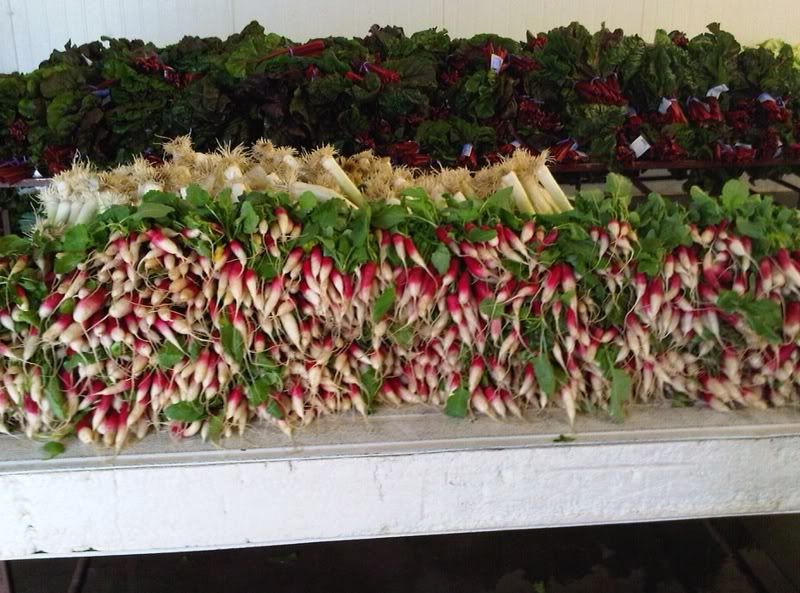
Organic radishes and other produce from Be Wise Ranch, ready for market.
Sustainable farmers around the state and the country began organizing. From 1990 to 1995, Bill was president of the California Certified Organic Farmers. During his tenure, CCOF was instrumental in passing legislation that established both statewide and national organic farming standards.
Soon, under the USDA’s new National Organic Program (NOP), whether a certified organic strawberry came from California or Georgia, it had to meet the same standards: plants grown in healthy, living soil without use of synthetic pesticides or fertilizers. Being certified organic also meant that the farm and its records were inspected annually by an independent agency to verify standards compliance.
Organic meant something, and there was a regulatory and enforcement body to ensure that it had teeth. Times were good for the certified organic farms and farmers trying to meet increasing consumer demand for organic products.
A perfect storm: the future of family farming and organic farms in California and the US
Fast forward to today… How is Be Wise Ranch doing? What future does Bill see for his and other farms around the country?
In short: Be Wise Ranch is in the middle of the perfect storm, and Bill is not optimistic about the future for his farm or farms across America. “We haven’t been profitable in a few years, but we are changing what we grow,” he says.
Labor shortages
From its peak at 900 acres, Be Wise Ranch has been scaled back to 266 acres today, still small compared to the 444 acres of the average US farm. There are a number of reasons for this smaller footprint, but labor shortages have been a primary factor. Finding workers has been a nightmare in recent years as the flow of temporary farm workers coming in and out of the country and the state has come to a halt.
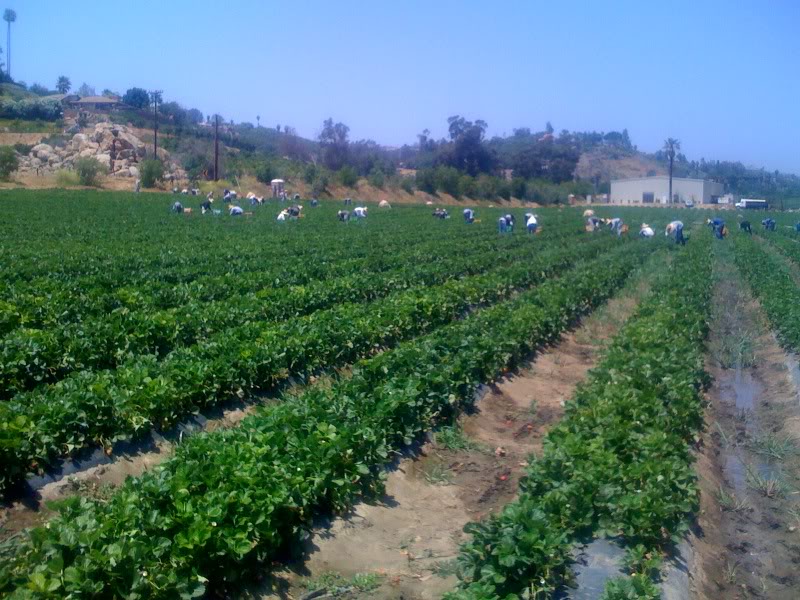
Workers harvesting strawberries at Be Wise Ranch.
Be Wise Ranch currently has about 35 workers, but Bill estimates that they need well over 100 to grow the diversified food crops that were once the foundation of their business model. As an example, the farm once grew about 80 acres of certified organic strawberries. Next year, he plans to grow only 3 acres of strawberries.

A colorful sample of some of the produce from years past at Be Wise Ranch.
The reason? Bill estimates that one third of this year’s strawberry crop rotted in the field because he couldn’t find labor to pick the fruit. “Lack of labor has severely restricted our growth,” Bill says. “We ended up opening the fields for u-pick to try to recoup some of our losses.”
California’s new minimum wage laws are going to further compound the problem for farmers. Be Wise Ranch has a starting wage of $12/hr + $1 more per hour each year over the next 3 years in addition to overtime wages that would kick in for pretty much every farm worker, given the long hours involved during peak harvest seasons.
Why not hire locals or native-born citizens? “I’d love to, but they can’t and won’t do the work for the prices US farmers can afford to pay. It’s incredibly grueling labor that also requires a lot of skill and experience. Working out in heat and cold doing manual labor for 9-10 hours a day is not work many Americans are willing to do. Migrant labor has filled that void since long before I started farming.”
Bill tells a funny story of a very fit professional tennis player he’s friends with who wanted to come out and pick food for a day to see what it was like. Out of concern for his friend’s health, Bill had him pick oranges, “the easiest crop we have to harvest.” Despite his physical fitness, Bill says his friend only made it about three hours before becoming physically exhausted and having to call it quits. “Now imagine doing that every day for 9 hours per day for months on end; that’s what being a farm laborer requires.”
Exporting farms, importing food
Bill talks to farmers across California and the US who are all experiencing similar hardships. Those who haven’t closed down are desperately trying to find some way to stay in business – to continue what are often multi-generational farming businesses that they feel a duty to carry on.
Well-financed large farms and international conglomerates have a multi-pronged approach, and two of those prongs for dealing with the labor crisis are: a) growing and importing produce from foreign farms, and b) replacing humans with robots, e.g. automation.
First, the large operations are starting to move their farms and processing facilities that require human labor south of the border if possible, where land and labor is both cheap and abundant. Then they’re importing the cheap food they produce back into the US, which keeps domestic consumer food prices low while driving even more US-based farms out of business.
Bill notes that this practice is especially pronounced in southern Mexico where farms pay migrant labor $5/day. (These workers are often from the “northern triangle” countries of El Salvador, Honduras, and Guatemala.) Bill didn’t want to speculate, but other California farmers we’ve spoken to have told us that many of the large farming operations in southern Mexico are de facto drug money laundering operations for drug cartels. They don’t care if they lose money farming legal crops so long as they can get their illicit drug money into the system.
In northern Mexico, farm workers now get $18/day, so this area of the country is less attractive to companies looking for the lowest-cost areas to operate. A few years ago, workers in the north unionized to protest low pay (they had been getting $6-10/day before striking).
The increasing trend of growing food south of the border and shipping it into the US might keep food costs down for American consumers, but it is wreaking havoc on American farms. “My guys are making $30-40,000 per year and that’s only going to go up. There’s no way I can compete and make a profit with farms operating with Mexican wages.”
Automation
“Are there machines that can pick strawberries yet?” I ask Bill.
“The giant multi-thousand acre farm operations still in the US are also able to stay in business by purchasing machines to replace their labor. This has been pretty standard for grain crops (which are also subsidized at a federal level) for a long time, but they’re finally starting to be able to get harvesting technology that works for everything from baby lettuce to strawberries now.”
Bill details the new strawberry picking machines (currently prototypes) that will only be feasible for massive farms operating at a scale far beyond Be Wise Ranch. It will cost about $100,000+ per machine, so the companies developing them are planning to lease them to large farmers during harvest season.
Unfortunately, according to Bill, whether leasing or purchasing this type of equipment, the expense only makes economic sense for giant farms who can eke out a reasonable return on the investment despite razor thin margins. If your net profit is small per acre, then you’d better have a lot of acreage to sustain a farm family.
“Only the biggest of the big farms are going to be able to survive in this environment, and they’re just biding their time until us little guys drop out of the game,” Bill says.
Bill also laments what he sees as loosening certified organic standards. “Certified organic used to be all about the soil; building your soil health which also helps sequester carbon and grow healthier, more nutritious food crops. Now in California and the USA, you can be certified organic growing soilless hydroponic vegetables. That’s the way the USDA recently decided, but that’s not true to the intent of what organic farming is supposed to be about: building soil. Since hydroponic operations can grow without the cost of improving their soil, they can also underprice soil-grown organic farmers, but the produce is lacking in flavor and a full spectrum of vital nutrients compared to certified organic soil-based farms.”
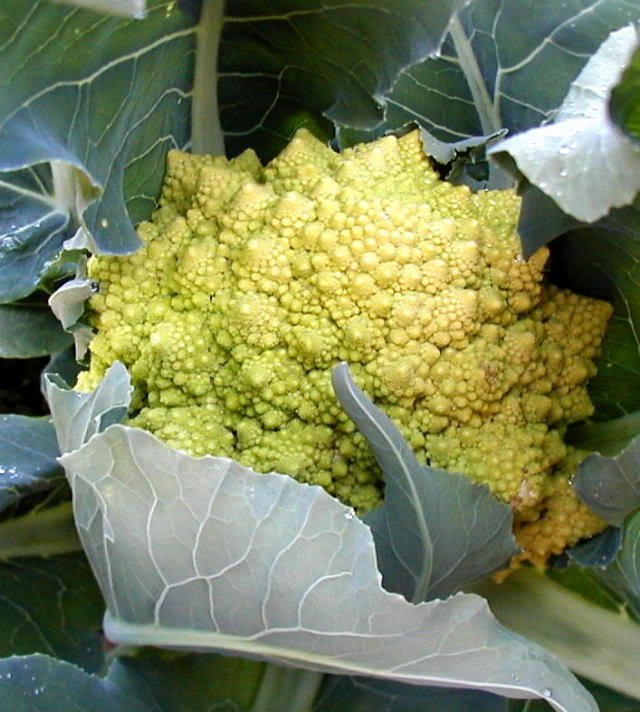
A beautiful Romanesco broccoli from Be Wise Ranch.
“Global weirding”
Everyone has heard of climate change or global warming, but farmers often refer to it as “global weirding” — increasingly strange, extreme, and unpredictable weather is happening more and more frequently.
In the past decade, Bill has had his home and a large amount of his farm (including facilities and equipment) burned to dust by wildfires. He’s had tomatoes cooked to pulp on the plants by extreme heat and whole strawberry crops reduced in half by extreme freezes. His farm is far enough from the Pacific Ocean that his temperatures have wider swings in the highs and lows.
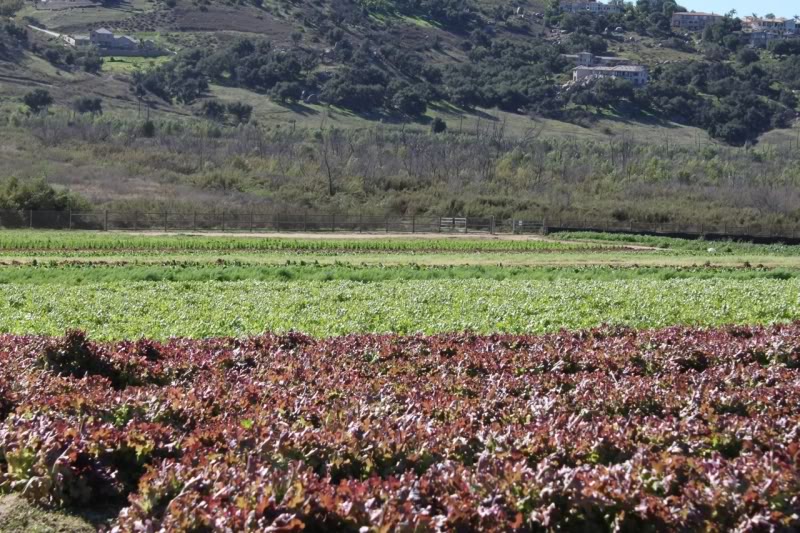
Fields of lettuce at Be Wise Ranch. The increasing frequency and severity of extreme weather events is taking its toll on farmers around the country, not just in California. Research has shown that organic farms can significantly outperform neighboring conventional farms during droughts, floods, and severe weather conditions, likely due to the healthier soil on organic farms, which makes the plants more resilient.
“People like the food we grow, but it’s hard to keep going when you keep losing money. All the long-term trends don’t look good.”
What can you grow profitably when you can’t grow food?
In response to this perfect storm of bad trends, Bill plans to convert a large portion of his acreage away from food production and towards a specialty hemp crop for high CBD. The end product will be a CBD assortment of products that are intended for pain relief, relaxation, or to help people transitioning off of cigarettes (it won’t contain addictive nicotine).
Compared to other areas of the country, Be Wise Ranch’s unique microclimate is ideally suited to produce the strain of hemp flowers, perhaps giving Bill an advantage that can’t be exported or replicated cheaper elsewhere.
Countless farmers across the US are also transitioning their food farms to hemp farms in hopes of taking advantage of what is currently a newly legal crop with higher margins. Of course, as Bill notes, the more farms chase the hemp “gold rush,” the lower it will drive hemp prices and profitability of the new crop.
“Even the farmers switching to hemp that I talk to think that they only have a few years before hemp no longer makes economic sense either. But it’s the only thing they can do to survive right now.”
How can we grow a better future from the soil up?
Our hearts break for all the farmers and workers who are being battered to death by the perfect storm of environmental, public policy, and economic calamities. While good food is still being grown by certified organic farms like Be Wise Ranch, Daily Harvest Express will do our best to support those people on the front lines, while bringing the healthiest possible food to your home or office.
In the meantime, please do everything you can to raise awareness about what’s happening to America’s farmers, let your politicians know you care, and vote for our local organic farmers with your forks, not just your ballots.
Here’s hoping for a vibrant, healthy future, from the soil up, because all of our lives depend on it.

